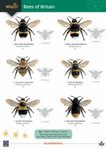Popular Science
By: Jürgen Tautz(Author), Diedrich Steen(Author)
277 pages, b/w illustrations
![The Honey Factory The Honey Factory]()
Click to have a closer look
About this book
Contents
Customer reviews
Biography
Related titles
About this book
Bee hives. They might look at first glance like seething anarchy, but the bees know exactly what they are doing. With astounding skill, precise expertise and impressive teamwork they carry out their plans. The Honey Factory plunges the reader into the life of a colony of bees and takes them on a tour of their 'factory'. This is a world inhabited by headstrong individuals with clever methods and an amazing set of rules.
Why aren't male bees allowed to stay in their colony just as it is getting cosy? What lies behind the sexual excesses of a young queen bee? And how do all the bees in a hive come to collective decisions? The Honey Factory answers these questions and more. Combining the most fascinating discoveries and greatest secrets in bee research, it ultimately shows readers why bees are so precious and why humans and bees cannot survive without each other.
Contents
Introduction
1 Feng shui in the pitch dark: The factory and equipment of a bee colony
- From a hollow tree to mass production: The evolution of beekeeping
- Comb network technology
2 Labouring in an annual rhythm: Teamwork in the honey factory
- Feminine power in the bee colony
- The bee dance: Rethinking old concepts
- The drones
- The queen bee
- Bee intelligence: How bees see the world
3 Honey is not everything, but nothing runs without honey: The honey production line
- Bee venom, royal jelly and beeswax
- Propolis, pollen and bee bread
- Creme de la creme - honey
4 Founding a daughter company: The swarm
- Driven by nature
- Swarm intelligence: How bees move house
- Events in the old factory: The terror of succession
- Beekeepers as killjoys
5 Industrial espionage, robberies and invaders: Bees as aggressors
- Hostile takeovers: How bees steal from one another
- The menace of Verroa mites
6 Industrial invaders: Bees and their struggle to survive
- The myth of the dying honeybees
- Industrial beekeeping and why dying out remains a possibility
- Back to the future: Rediscovering old practices
Epilogue: Are honeybees self-aware?
Appendix
Customer Reviews
Biography
Jürgen Tautz is an internationally recognised expert on bees and professor emeritus at W3rzburg University. Since 2006 he has been in charge of the HOneyBee Online Studies (HOBOS) interdisciplinary project. Tautz has authored numerous publications and been awarded several prizes for his work in science education.
Diedrich Steen is a publishing director. Bees have been kept in his family for over 100 years, and he has been an active beekeeper himself for twenty years.
Popular Science
By: Jürgen Tautz(Author), Diedrich Steen(Author)
277 pages, b/w illustrations
"An enriching read for anyone who is moved by the secret beauty of our world and who cares about the future of our ecosystems."
– Peter Wohlleben
































